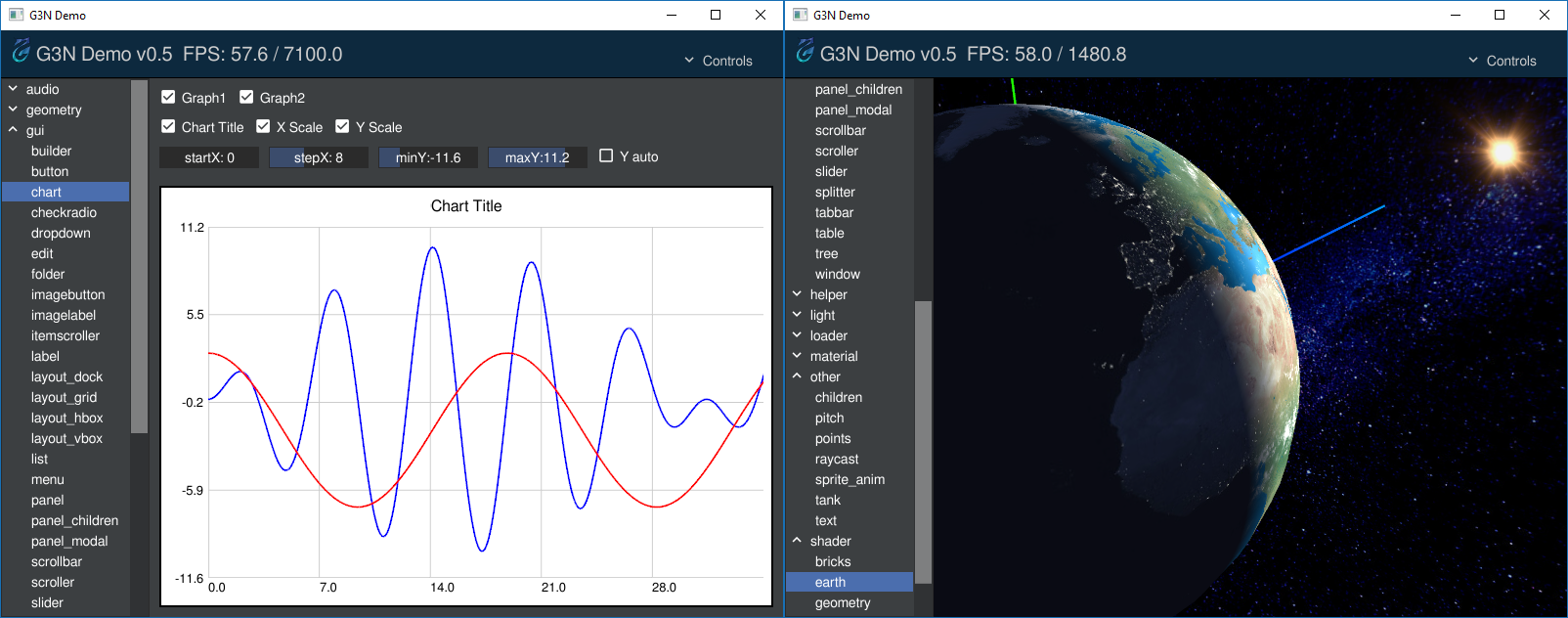G3N (pronounced "gen") is an OpenGL 3D Game Engine written in Go. It can be used to write cross-platform Go applications that show rich and dynamic 3D representations - not just games. A basic integrated GUI framework is provided, and 3D spatial audio is supported through OpenAL.
- Gokoban - 3D Puzzle Game (1st place in the 2017 Gopher Game Jam)
- go-tsne (dimensionality reduction particularly well suited for visualizing high-dimensional datasets)
- G3N Server-Side Rendering
Go 1.8+ is required. The engine also requires the system to have an OpenGL driver and a GCC-compatible C compiler.
On Unix-based systems the engine depends on some C libraries that can be installed using the appropriate distribution package manager. See below for OS specific requirements.
$ sudo apt-get install xorg-dev libgl1-mesa-dev libopenal1 libopenal-dev libvorbis0a libvorbis-dev libvorbisfile3
$ sudo dnf -y install xorg-x11-proto-devel mesa-libGL mesa-libGL-devel openal-soft openal-soft-devel libvorbis libvorbis-devel glfw-devel libXi-devel libXxf86vm-devel
Enable the EPEL repository:
$ sudo yum -y install https://dl.fedoraproject.org/pub/epel/epel-release-latest-7.noarch.rpm
Then install the same packages as for Fedora - remember to use yum instead of dnf for the package installation command.
$ sudo pacman -S base-devel xorg-server mesa openal libvorbis
$ sudo xbps-install git xorg-server-devel base-devel libvorbis-devel libvorbis libXxf86vm-devel libXcursor-devel libXrandr-devel libXinerama-devel libopenal libopenal-devel libglvnd-devel
We tested the Windows build using the mingw-w64 toolchain (you can download this file in particular).
The necessary audio DLLs are supplied and need to be added to your PATH. If you would like to build the DLLs yourself you can find the libraries' source code and build instructions here.
Install the development files of OpenAL and Vorbis using Homebrew:
brew install libvorbis openal-soft
The following set of commands will download and install the engine along with all its Go dependencies:
git clone https://github.com/g3n/engine g3n-engine
cd g3n-engine
go install ./...
- Cross-platform: Windows, Linux, and macOS. (WebAssembly is 90% complete!)
- Integrated GUI (graphical user interface) with many widgets
- Hierarchical scene graph - nodes can contain other nodes
- 3D spatial audio via OpenAL (.wav, .ogg)
- Real-time lighting: ambient, directional, point, and spot lights
- Physically-based rendering: fresnel reflectance, geometric occlusion, microfacet distribution
- Model loaders: glTF (.gltf, .glb), Wavefront OBJ (.obj), and COLLADA (.dae)
- Geometry generators: box, sphere, cylinder, torus, etc...
- Geometries support morph targets and multimaterials
- Support for animated sprites based on sprite sheets
- Perspective and orthographic cameras
- Text image generation and support for TrueType fonts
- Image textures can be loaded from GIF, PNG or JPEG files
- Animation framework for position, rotation, and scale of objects
- Support for user-created GLSL shaders: vertex, fragment, and geometry shaders
- Integrated basic physics engine (experimental/incomplete)
- Support for HiDPI displays
The code below is a basic "hello world" application (hellog3n) that shows a blue torus and a button that when clicked makes the torus red:
package main
import (
"github.com/g3n/engine/app"
"github.com/g3n/engine/camera"
"github.com/g3n/engine/core"
"github.com/g3n/engine/geometry"
"github.com/g3n/engine/gls"
"github.com/g3n/engine/graphic"
"github.com/g3n/engine/gui"
"github.com/g3n/engine/light"
"github.com/g3n/engine/material"
"github.com/g3n/engine/math32"
"github.com/g3n/engine/renderer"
"github.com/g3n/engine/util/helper"
"github.com/g3n/engine/window"
"time"
)
func main() {
// Create application and scene
a := app.App()
scene := core.NewNode()
// Set the scene to be managed by the gui manager
gui.Manager().Set(scene)
// Create perspective camera
cam := camera.New(1)
cam.SetPosition(0, 0, 3)
scene.Add(cam)
// Set up orbit control for the camera
camera.NewOrbitControl(cam)
// Set up callback to update viewport and camera aspect ratio when the window is resized
onResize := func(evname string, ev interface{}) {
// Get framebuffer size and update viewport accordingly
width, height := a.GetSize()
a.Gls().Viewport(0, 0, int32(width), int32(height))
// Update the camera's aspect ratio
cam.SetAspect(float32(width) / float32(height))
}
a.Subscribe(window.OnWindowSize, onResize)
onResize("", nil)
// Create a blue torus and add it to the scene
geom := geometry.NewTorus(1, .4, 12, 32, math32.Pi*2)
mat := material.NewStandard(math32.NewColor("DarkBlue"))
mesh := graphic.NewMesh(geom, mat)
scene.Add(mesh)
// Create and add a button to the scene
btn := gui.NewButton("Make Red")
btn.SetPosition(100, 40)
btn.SetSize(40, 40)
btn.Subscribe(gui.OnClick, func(name string, ev interface{}) {
mat.SetColor(math32.NewColor("DarkRed"))
})
scene.Add(btn)
// Create and add lights to the scene
scene.Add(light.NewAmbient(&math32.Color{1.0, 1.0, 1.0}, 0.8))
pointLight := light.NewPoint(&math32.Color{1, 1, 1}, 5.0)
pointLight.SetPosition(1, 0, 2)
scene.Add(pointLight)
// Create and add an axis helper to the scene
scene.Add(helper.NewAxes(0.5))
// Set background color to gray
a.Gls().ClearColor(0.5, 0.5, 0.5, 1.0)
// Run the application
a.Run(func(renderer *renderer.Renderer, deltaTime time.Duration) {
a.Gls().Clear(gls.DEPTH_BUFFER_BIT | gls.STENCIL_BUFFER_BIT | gls.COLOR_BUFFER_BIT)
renderer.Render(scene, cam)
})
}You can download and install hellog3n via:
go get -u github.com/g3n/demos/hellog3n
For more complex demos please see the G3N demo program.
The complete engine API reference can be found here: .
There is also the beginning of a Getting Started Guide, and a newly created list of Guides and Tutorials:
Along with those, a good way to learn how to use the engine is to see the source code of G3ND - the G3N demo.
If you find a bug or create a new feature you are encouraged to send pull requests!
Join our Discord channel. It's the best way to have your questions answered quickly by the G3N community.




